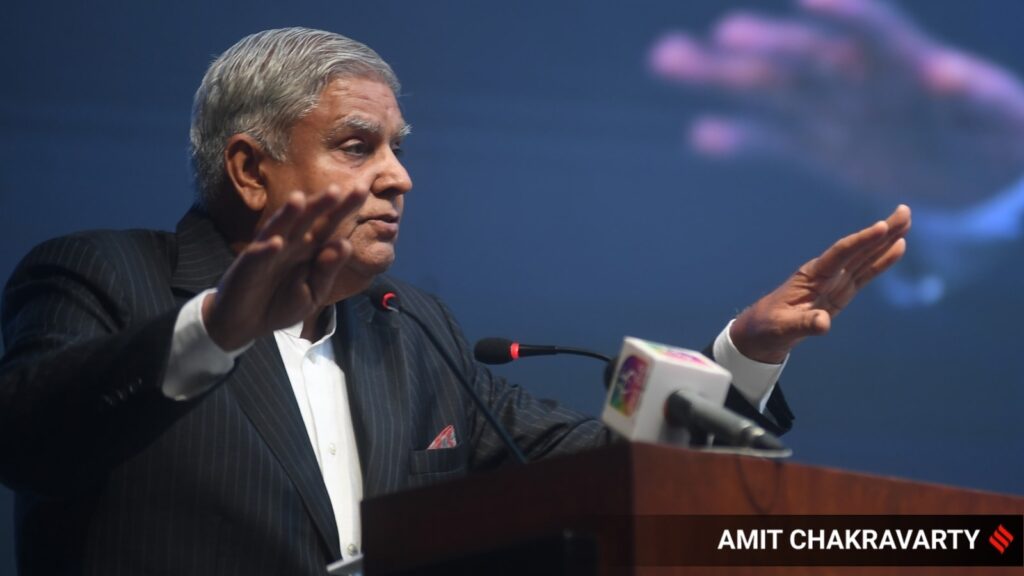Dhankhar, 74, who is also the Rajya Sabha Vice-Chairman, is unlikely to attend the proceedings of the House during the ongoing Monsoon Session on Tuesday.
In his resignation letter, Dhankhar thanked the President for her “unwavering support” and the “soothing, wonderful working relationship” they shared. He expressed gratitude to Prime Minister Narendra Modi and his Council of Ministers for their “invaluable support,” adding that the warmth and affection shown by MPs “will remain embedded” in his memory.
The resignation came just hours after what turned out to be his final sitting as the Rajya Sabha Chairman. There was no indication about it during the day.
Dhankhar assumed office as the 14th Vice-President of India in August 2022. In the Vice-Presidential polls, as the BJP-led NDA candidate, he trounced the Opposition’s nominee Margaret Alva comfortably by securing 528 votes against the latter’s 182.
He had not been a stranger to rows. His stint as the Rajya Sabha Chairman had remained turbulent, as he had runs-ins with the Opposition members on a regular basis. He also stridently took on the judiciary over the issue of separation of powers.
Dhankhar has been the only Vice-President against whom the Opposition brought a notice of removal for “partisan” conduct as the Rajya Sabha Chairman. The notice was rejected by Deputy Chairman Harivansh, even as Dhankhar dubbed it as a “rusted” vegetable-cutting knife which, he said, was used for a bypass surgery.
Story continues below this ad
Prior to the second highest constitutional office, Dhankhar had been the West Bengal Governor.
Since July 2019, when the Modi government sent him to the Kolkata Raj Bhavan, Dhankhar had been at loggerheads with the Mamata Banerjee-led Trinamool Congress (TMC) government on a range of issues.
For a leader known more for his face-offs with the Banerjee government as the Governor, and whom the TMC had often accused of acting as an “agent of BJP”, the first election Dhankhar contested was on a Janata Dal ticket, when he was elected to the Lok Sabha from Rajasthan’s Jhunjhunu in 1989.
His next election was for the Rajasthan Assembly — this time on a Congress ticket. Having represented the Kishangarh Assembly constituency from 1993 to 1998, Dhankhar, a graduate from University of Rajasthan, Jaipur, who completed his LLB degree in 1978-79, was also a former president of the Rajasthan High Court Bar Association.
Story continues below this ad
“From 1998, he was a full-time senior advocate practising in Supreme Court — until he was appointed the Governor of West Bengal in 2019,” according to his younger brother Randeep Dhankhar.
After he joined the BJP, Dhankhar, a Jat leader, became the national convener of the BJP’s law and legal affairs department in 2016.
Born into a farmer’s family at Kithana village in Jhunjhunu district in 1951, Dhankhar studied at a local government school before going to Sainik school in Chittorgarh. He is married to Sudesh Dhankhar and they have a daughter, Kamna.
During his role as the Bengal Governor, Dhankhar had been virtually a one-man opposition in the state, having taken on the TMC government regularly over various issues. In fact, such acrimonious had been the relationship that CM Banerjee had even blocked Dhankhar on social media.
Story continues below this ad
From law and order situation in the state to post-poll violence, and from corruption charges to lapses in bureaucracy, Dhankhar was never short of issues to criticise the TMC government.
The relation between Dhankhar and the Mamata government took a turn for the worse when the latter decided to replace the Governor with the CM as the Chancellor of the state universities. While the TMC had accused Dhankhar of not clearing various Bills and creating “unnecessary hurdles” in the functioning of the state government, the latter claimed he had gone by the book and the Constitution in pointing out issues to the government and the state legislature. Dhankhar had often sought details, especially details of expenditure, from the state government on various issues.
Interestingly, in the V-P polls, the TMC MPs had abstained from voting, not backing the Opposition candidate, which left many baffled given the protracted bad blood between the party leadership and Dhankhar.
Dhankhar is said to be an avid reader, a sports aficionado — he has been president of the Rajasthan Olympic Association and Rajasthan Tennis Association — and loves travelling with his family.
Story continues below this ad
In 1989, the then Haryana CM Chaudhary Devi Lal had vigorously campaigned for Dhankhar when the Janata Dal had fielded him in the parliamentary polls from Jhunjhunu.
Ranjit Singh Chautala, Devi Lal’s son and former Haryana minister, had earlier told The Indian Express: “Dhankhar is like a member of our family. He came into politics after being influenced by Devi Lal.” Ranjit had said: “In 1987, Chaudhary Devi Lal had called for a rally of the Opposition at Boat Club in Delhi. Dhankhar brought as many as 500 vehicles full of people from Jhunjhunu to participate in the rally. Devi Lal patted him on the back. Devi Lal called him from his home and offered a ticket of Janata Dal to contest from the Jhunjhunu Lok Sabha constituency in 1989.” Dhankhar won the election and became minister of state (parliamentary affairs) in the V P Singh-led government when Devi Lal became Deputy Prime Minister.
Ranjit Chautala had recalled that “Following differences, PM V P Singh had dismissed Devi Lal in 1990. Then, Dhankhar was the only minister who resigned from the Union Cabinet standing by Devi Lal. It impressed Devi Lal who called Dhankhar a man of commitment.” Later, Devi Lal became Deputy PM in the minority government led by Chandrashekhar while Dhankhar also became a minister in his government.


